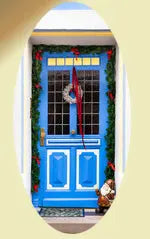O Menino Mija?
Yes, you read that sub-title correctly. Stating that the baby boy pees is a Portuguese Christmas thing in the Açores. Leave it to the Açorian Portuguese to make a statement about a bodily function be part of a Christmas tradition. But wait, we need context.
We Portuguese are known for our love of our friends, the family, and a passion for celebrating with our whole hearts. One example of that love happens every year in the Açores. This occurs during the Christmas season between the period marking the birth of Jesus to the period of the visit from the Three Wise Men/Kings. During this time in the Açores, it’s common for small groups of acquaintances to form and take to the streets, another very Portuguese habit; where they walk from house to house of friends and family. When the visitors are greeted at the door and exclaim “O menino mija” the owner of the house treats them to traditional liqueurs, dried figs, and pastries. This sounds to me like an adult Christmas version of “trick or treat”. We Portuguese and our love of celebration really does go all out, doesn’t it? After much exchanging of holiday greetings and well wishes, the visitors then continue to visit other friends and family throughout the evening.
This endearing tradition’s origin dates back centuries. It started during a time when people would make home-made liqueurs during the Christmas season. They then would invite friends to go to their homes to taste the liqueurs. Since these drinks were made in honor of the baby Jesus, whenever they were poured into a glass, it was referred to as the baby Jesus urinating or “O Menino Mija”. Now today, while many folks may not have guessed how this custom started, my bet is most would agree they see why it remains a beloved Portuguese tradition.
Merry Christmas from your Rooster Camisa Family

